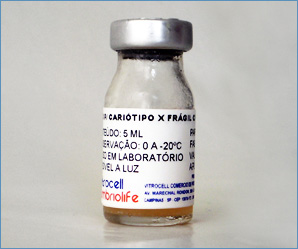 KARYOTYPE MEDIUM KARYOTYPE MEDIUM

|
|
CULTURE METHOD: In aseptic conditions 0.5 – 1.0 ml of blood is placed into a KARYOTYPE MEDIUM, incubated at 37°C. Initially, the red blood cells form a sediment (by gravity action) causing an agglutination by the action of phytohemagglutinin. Lymphocytes are suspended and, by the mitogenic action of phytohemagglutinin, multiplied. After 72 hours of incubation, colchicine is added into the medium with the purpose to interrupt cell division in metaphase, when the chromosomes are better individualized. This culture is treated with a hypotonic solution and then fixed in Methanol and Acetic acid (3:1).
The sedimented cells are fixed in glass slides where they can be evaluated for number and morphology. If the band technique is used, it is possible to structurally evaluate their bands and sub-bands.
COMPONENTS: Solution is constituted of MEM medium or RPMI 1640 with HEPES, FETAL BOVINE SERUM, and PHYTOHEMAGGLUTININ.
We also have the karyotype medium for research of the FLAGILE SITE from X chromosome. In that case, MEM medium is substituted by Medium 199 without folic acid.
ADVANTAGES: Tested in several cultures of peripheral human blood. Ph and osmolality are determined for each lot.
PRESENTATION : Sterile bottles with 5 ml
STORAGE : 0 to -20°C.
SHELF LIFE : 12 months |





